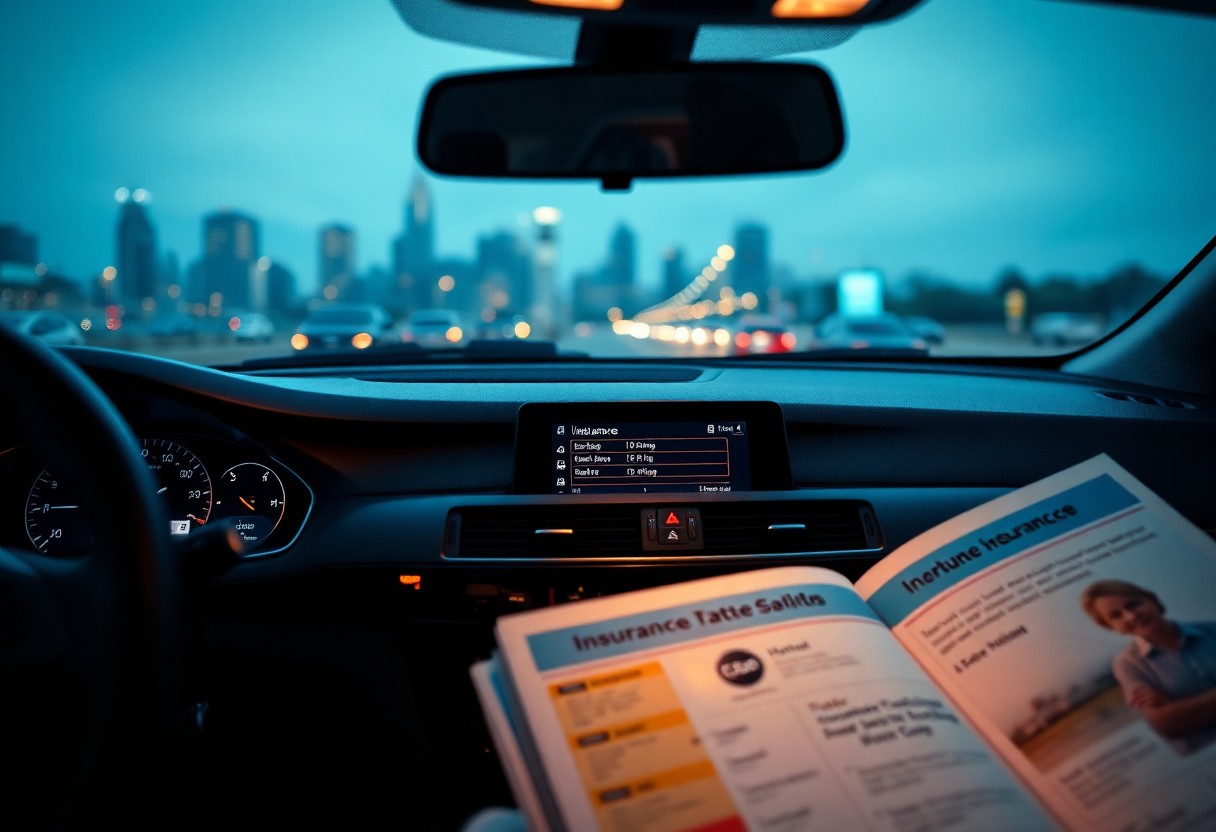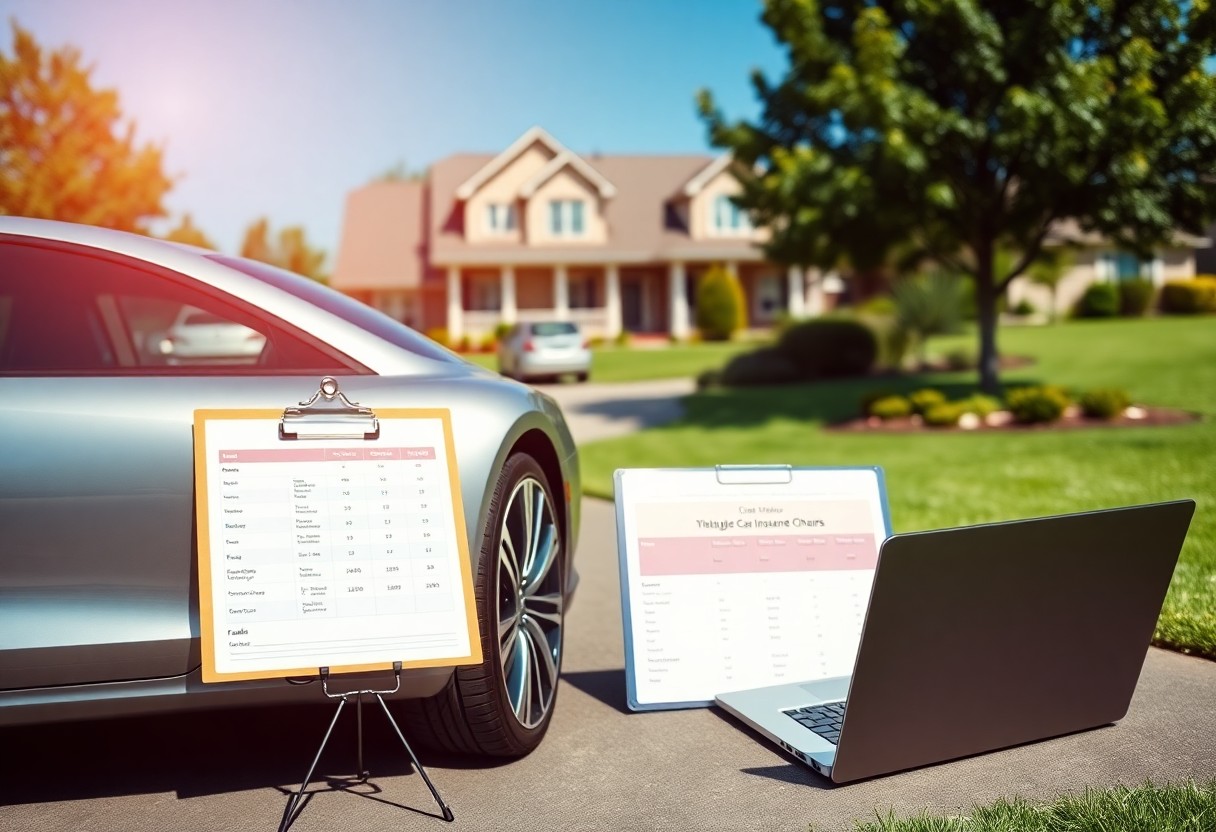You need to consider the top car insurance features that will best protect your vehicle from unexpected situations. With the right coverage, you can safeguard against financial loss from accidents, theft, or damage. Essential features such as comprehensive coverage, collision coverage, and liability protection offer significant peace of mind. Additionally, roadside assistance and rental car reimbursement can enhance your protection plan, ensuring you’re covered when you need it most. Understanding these elements will empower you to secure the most effective policy for your driving needs.

Key Takeaways:
- Comprehensive coverage protects against non-collision incidents like theft and natural disasters.
- Collision coverage pays for damages to your vehicle resulting from accidents.
- Liability coverage shields you from financial responsibility for others’ injuries and property damage.
- Personal injury protection (PIP) covers medical expenses regardless of fault in an accident.
- Additional features like roadside assistance and rental car reimbursement enhance overall protection.
Understanding Car Insurance Basics
Car insurance serves as a financial safeguard, helping to cover costs associated with accidents, theft, or damages to your vehicle. It’s imperative to grasp how different policies work to select coverage that fits your needs. By familiarizing yourself with terms such as premiums, deductibles, and coverage limits, you can better navigate your options and make informed decisions when selecting a policy.
Types of Car Insurance Coverage
Different types of car insurance coverage cater to varying needs and circumstances. The main types include:
- Liability coverage – covers damages to others in an accident you cause.
- Collision coverage – pays for repairs to your car post-accident.
- Comprehensive coverage – protects against theft and non-collision damage.
- Medical payments coverage – assists with medical expenses for you and passengers.
- Uninsured/underinsured motorist coverage – offers protection in case of accidents with uninsured drivers.
After considering your driving habits and local regulations, choosing the right coverage can significantly impact your financial protection.
| Insurance Type | Coverage Description |
| Liability Coverage | Protection against claims for damages to others. |
| Collision Coverage | Covers damages to your vehicle post-accident. |
| Comprehensive Coverage | Coverage for theft and damages not involving collisions. |
| Medical Payments | Helps cover medical expenses for injuries. |
| Uninsured/Underinsured | Protection against drivers lacking proper coverage. |
Importance of Liability Coverage
Liability coverage is a fundamental aspect of car insurance, providing protection against legal claims for damages or injuries you cause in an accident. Without it, you might be responsible for covering costly medical bills or property repairs out of pocket.
Liability coverage typically includes two components: bodily injury liability and property damage liability. Bodily injury liability covers medical expenses, lost wages, and pain and suffering for the other party in an accident you cause. Property damage liability addresses repairs or replacement of the other person’s vehicle or property. Most states require a minimum amount of liability coverage, but opting for more than the minimum is advisable to protect your financial future against lawsuits and high damages. Having adequate liability coverage can shield you from catastrophic financial burdens, ensuring peace of mind while you drive.
Essential Features for Vehicle Protection
Opting for the right car insurance involves assessing the important features that ensure comprehensive protection for your vehicle. Look for policies that offer coverage for theft, natural disasters, and accidents, all while ensuring peace of mind. For a deeper understanding, check out this Best Car Insurance Buying Guide to navigate the various options available.
Comprehensive Coverage
Comprehensive coverage protects your vehicle against non-collision-related incidents. This includes damage from theft, vandalism, fire, or natural disasters like floods and hurricanes. If your vehicle is stolen or irreparably damaged, this coverage can save you substantial costs.
Collision Coverage
Collision coverage offers financial protection when your vehicle is damaged in an accident, regardless of fault. With this feature, you can recover costs associated with repairs or replacement of your car, helping you avoid severe financial strain after a collision.
Understanding the importance of collision coverage can significantly impact your financial stability. Accidents occur unexpectedly, with the National Highway Traffic Safety Administration reporting over 6 million crashes annually in the U.S. Without this coverage, you face out-of-pocket expenses that may exceed your vehicle’s value. With collision insurance, you can confidently drive, knowing that your investment is safeguarded against the costs of repairs or replacement, enabling a smoother claims process and restoring your mobility quickly.
Additional Coverage Options
Beyond the basic policies, additional coverage options can tremendously enhance your protection. Optional coverages help tailor your car insurance to your specific needs, addressing unique risks and providing peace of mind. For instance, comprehensive insurance can protect you from non-collision incidents like theft or natural disasters, while collision coverage guards against damage from accidents. By considering these add-ons, you can ensure your vehicle remains safeguarded against various unforeseen circumstances.
Uninsured/Underinsured Motorist Coverage
Uninsured/underinsured motorist coverage shields you from financial losses when you’re involved in an accident with a driver who lacks adequate insurance. This protection is vital as, according to the Insurance Information Institute, about 1 in 8 drivers in the U.S. are uninsured. If you’re in a collision with one of these drivers, this coverage can help cover medical costs and damages that might otherwise go unpaid, ensuring that you’re not left to bear the entire financial burden.
Personal Injury Protection
Personal Injury Protection (PIP) offers comprehensive coverage for your medical expenses and lost wages regardless of who caused the accident. This type of insurance can cover not only your hospital bills but also rehabilitation and even funeral expenses, making it particularly valuable in severe accidents. Many states require PIP coverage, emphasizing its importance in minimizing out-of-pocket costs while focusing on recovery.
PIP can cover up to 80% of medical expenses after an automobile accident, including visits to doctors, emergency services, and even chiropractic care. If you are unable to work due to injury, it can also provide up to 60% of lost income, ensuring you can maintain financial stability while recovering. The wide-ranging benefits of PIP make it a vital component of comprehensive car insurance, as it alleviates the stress of financial burdens during challenging times.
Discounts and Savings
Taking advantage of discounts and savings can significantly reduce your car insurance premiums. Insurers often provide various opportunities for you to save money, such as safe driving records, loyalty discounts, and more. By understanding and leveraging these options, you can ensure you get the best coverage at the lowest cost.
Safe Driver Discounts
A safe driving record often earns you discounts from your insurance provider. If you have no accidents or traffic violations, insurers reward you with lower premiums. Some companies might even offer substantial savings for maintaining a clean driving history over several years, making it beneficial to practice safe habits behind the wheel.
Bundling Policies
Bundling your car insurance with other policies, such as homeowner’s or renter’s insurance, can lead to impressive savings. Insurance companies frequently offer discounts for customers who purchase multiple policies together. This not only simplifies your insurance management but also enhances your overall coverage while keeping costs down.
Many insurers promote bundling as a way to increase your savings. For example, a typical discount for bundling can range from 10% to 25%, depending on the provider. Additionally, managing fewer policies can reduce administrative hassles and help you stay organized. Assessing your current coverage and exploring multi-policy discounts can reveal substantial savings opportunities, giving you enhanced financial flexibility.
Choosing the Right Deductible
Selecting the appropriate deductible is imperative for managing your car insurance costs effectively. A higher deductible can lower your premium significantly, leading to immediate savings. However, it also means you will pay more out of pocket in the event of a claim. Striking the right balance based on your financial situation and driving habits will help you achieve optimal protection for your vehicle.
Impact on Premiums
Your choice of deductible directly influences your insurance premiums. Generally, a higher deductible results in lower monthly costs, as insurers assume less risk. For example, increasing your deductible from $500 to $1,000 can save you an average of 10-20% on your premium. However, choosing a deductible too high might cause financial strain during an accident, so evaluate your personal budget before deciding.
Balancing Risk and Affordability
Finding the ideal deductible involves evaluating both risk and affordability. Assessing how much you can comfortably pay out-of-pocket in the event of a claim versus how much you’re willing to spend on premiums requires careful consideration. For drivers who rarely file claims, a higher deductible might make sense, while those with a history of frequent claims may prefer a lower deductible for better cash flow during unexpected repairs.
Balancing risk and affordability also means considering your vehicle’s age, value, and driving frequency. Newer or high-value cars might warrant a lower deductible to minimize loose ends in substantial accidents, while older cars may not justify the higher premiums associated with a low deductible. Examining your driving habits can further refine your decision; frequent long-distance drives may increase the likelihood of claims, prompting a more cautious approach to deductible selection. Ultimately, aligning your deductible choice with your unique financial landscape ensures you have coverage that meets both your protection needs and budgetary constraints.

Evaluating Insurance Providers
Choosing the right insurance provider involves an in-depth evaluation of several factors that can significantly impact your coverage experience. Assess policies, pricing, and the company’s reputation in the industry. Request quotes from multiple insurers and carefully compare their benefits, deductibles, and limitations to identify the best fit for your specific needs.
Customer Service and Claims Process
Customer service quality can directly affect your overall satisfaction. Prompt, helpful service during the claims process is vital, especially in times of stress. Research how insurers handle claims and whether they offer online tools for tracking progress, along with 24/7 customer support options.
Financial Stability and Reviews
Evaluating the financial stability of an insurance company ensures that they can honor claims when necessary. Look for high ratings from independent agencies like A.M. Best or Moody’s, which indicate a company’s ability to meet its long-term obligations.
Financial stability is reflected through ratings that gauge an insurer’s performance and reliability. For instance, companies rated “A” or higher by agencies like A.M. Best exhibit robust fiscal health, reassuring you that they will handle claims effectively in economic downturns. Additionally, reading online reviews and customer feedback provides insight into real-life experiences, helping you discern potential issues before making a commitment. A solid financial foundation coupled with positive customer experiences signals that the provider is a trustworthy choice for your insurance needs.
Summing up
As a reminder, selecting the right car insurance features is necessary for protecting your vehicle and ensuring peace of mind. You should consider options like comprehensive coverage, liability protection, and roadside assistance to tailor your policy to your needs. These features not only safeguard your investment but also provide financial support in unforeseen situations. By prioritizing these elements in your insurance plan, you enhance the security of your vehicle while also complying with legal requirements.
FAQ
Q: What are the imperative features of comprehensive car insurance?
A: Comprehensive car insurance typically includes coverage for theft, vandalism, natural disasters, and damage from animals. It protects the vehicle from a wide range of non-collision incidents, ensuring greater security for the owner.
Q: How does collision coverage work in car insurance?
A: Collision coverage pays for damages to your vehicle resulting from a collision with another vehicle or object, regardless of fault. This coverage is beneficial for repairs or replacement, helping to minimize out-of-pocket expenses.
Q: What is liability coverage and why is it important?
A: Liability coverage protects you financially if you’re found at fault in an accident that causes injury or property damage to others. It is required by law in many places and imperative for safeguarding your assets against potential lawsuits.
Q: Can I add roadside assistance to my car insurance policy?
A: Yes, many insurance companies offer roadside assistance as an add-on feature. This provides support for emergencies like flat tires, dead batteries, or towing services, enhancing the security of being on the road.
Q: What discounts are commonly available for car insurance?
A: Common discounts for car insurance may include safe driver discounts, multi-policy discounts, bundling home and auto insurance, good student discounts, and discounts for vehicle safety features. These can help lower your premium significantly.





0 Comments